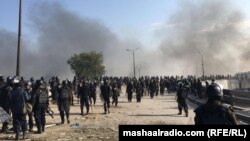After deadly violence, Islamist protesters clash with Pakistani police for second day
| Publisher | Radio Free Europe/Radio Liberty |
| Publication Date | 26 November 2017 |
| Cite as | Radio Free Europe/Radio Liberty, After deadly violence, Islamist protesters clash with Pakistani police for second day, 26 November 2017, available at: https://www.refworld.org/docid/5a9fc6894.html [accessed 31 May 2023] |
| Disclaimer | This is not a UNHCR publication. UNHCR is not responsible for, nor does it necessarily endorse, its content. Any views expressed are solely those of the author or publisher and do not necessarily reflect those of UNHCR, the United Nations or its Member States. |
Last Updated: November 26, 2017 15:28 GMT
RFE/RL's Radio Mashaal
 At least one police officer was killed by stone-throwing demonstrators and more than 80 police were injured in the November 25 clashes.
At least one police officer was killed by stone-throwing demonstrators and more than 80 police were injured in the November 25 clashes.
ISLAMABAD – Islamist party activists have clashed with security forces for a second day on the outskirts of Islamabad, burning vehicles before withdrawing to a protest camp they have maintained for nearly three weeks.
The violence on November 26 came a day after clashes between the hard-line Islamist protesters and Pakistani security forces killed at least six people, and injured more than 200 others – many of them police hit by stones that were thrown by the protesters.
The violence prompted Pakistan's Interior Ministry late on November 25 to authorize the deployment of "sufficient troops" from the country's military to "control law and order" in the city until further notice.
Reports said army troops were meant to secure sensitive installations, diplomatic enclaves, as well as the offices of the judiciary, parliament, presidency, prime minister, and Foreign Ministry.
But although police and paramilitary forces surrounded the protest camp in the Faizabad District, there were no army troops at the scene of the demonstration early on November 26.
"We will move when we have orders," Police Superintendent Amir Niazi said early on November 26. "What the protesters did yesterday was in no means was lawful. They attacked our forces."
Larger Numbers
Shortly after dawn on November 26, smoke could be seen billowing from the charred remains on the road of a car and three motorcycles that had been torched by demonstrators, who then retreated back to their nearby protest camp.
About 2,000 protesters have maintained the camp since November 6, blocking a main road into Islamabad that is used by thousands of commuters coming from the nearby garrison city of Rawalpindi.
But early on November 26, it was clear that the protest rally had grown to even larger numbers, including several thousand members of the Tehreek-e Labaik Ya Rasool Allah party.
Protests also have spread to nine other cities and towns, including Pakistan's southern port city of Karachi.
RFE/RL's Radio Mashaal reported on November 26 that protesters also had entered Islamabad's I-8 sector – an area bordering Rawalpindi.
Pakistani opposition politicians from Islamist parties on November 26 blamed the violence in the capital on the government.
Shehryar Khan Afridi, a parliamentary deputy from Pakistan Tehreek-e- Insaf, told RFE/RL's Radio Mashaal that "the government used force, which was not a [suitable] measure, causing injuries and damage to public property."
'Perplexing Situation'
Muhammad Ibrahim Khan, a leader of the religious Jamaat-e-Islami opposition party, told RFE/RL that the government "seems to be failing," and should have contacted opposition parties with "considerable presence in the parliament before taking action."
But Mia Iftikhar Hussain, leader of the opposition Awami National Party, noted that the government action came after the courts ordered authorities to remove the protesters.
"The government showed patience for 20 days," Hussain told RFE/RL. "After the court's ruling, it was in a perplexing situation where, if it does not act following the court's instruction, the court will retaliate. And if it acts, the people will react."
Allies of the governing Pakistan Muslim League-N also defended the police operation aimed at removing the protest camp.
"The government did not have any other option to disperse the protestors," Abuld Qahar Wadan, a parliamentary deputy from the Pashtunkhwa Milli Awami Party told RFE/RL. "Some political parties that align with dictators said it was a wrong action."
"The government had consulted them. It had assured the protesters that it will meet their demands. But the protesters demanded the government to resign. it does not happen this way anywhere in the world."
Another religious leader Tahirul Qadri, who protested for months against the government in 2014, was due to arrive in Pakistan on November 26 from his current base in Canada. Qadri announced on November 25 that he plans to address a rally in Lahore.
Broadcasting Restrictions
Meanwhile, Pakistan's Electronic Media Regulatory Authority (PEMRA) late on November 26 ordered the restoration of cable television broadcasts, which the governmental media regulator had shut down in the midst of the violence a day earlier.
That order was issued after journalists and their unions on November 26 demanded the private television channels be allowed to broadcast coverage of the protests in Islamabad and other cities via cable.
Separately, Pakistan's telecom authority also banned access to social media networks like Twitter, YouTube, and Dailymotion in an attempt to prevent coverage of the standoff between the Islamist protesters and authorities.
Police on November 25 fought running battles with the Islamists, who are demanding the resignation of Pakistani Law Minister Zahid Hamidover over what they claim was a blasphemous parliamentary bill to amend the country's election laws.
Despite the operation involving 8,500 elite police and paramilitary troops in riot gear – and the use of tear gas and batons by authorities – the security forces on November 25 were unable disperse those at the protest camp.
With reporting by Reuters, AP, AFP, and BBC
Link to original story on RFE/RL website
